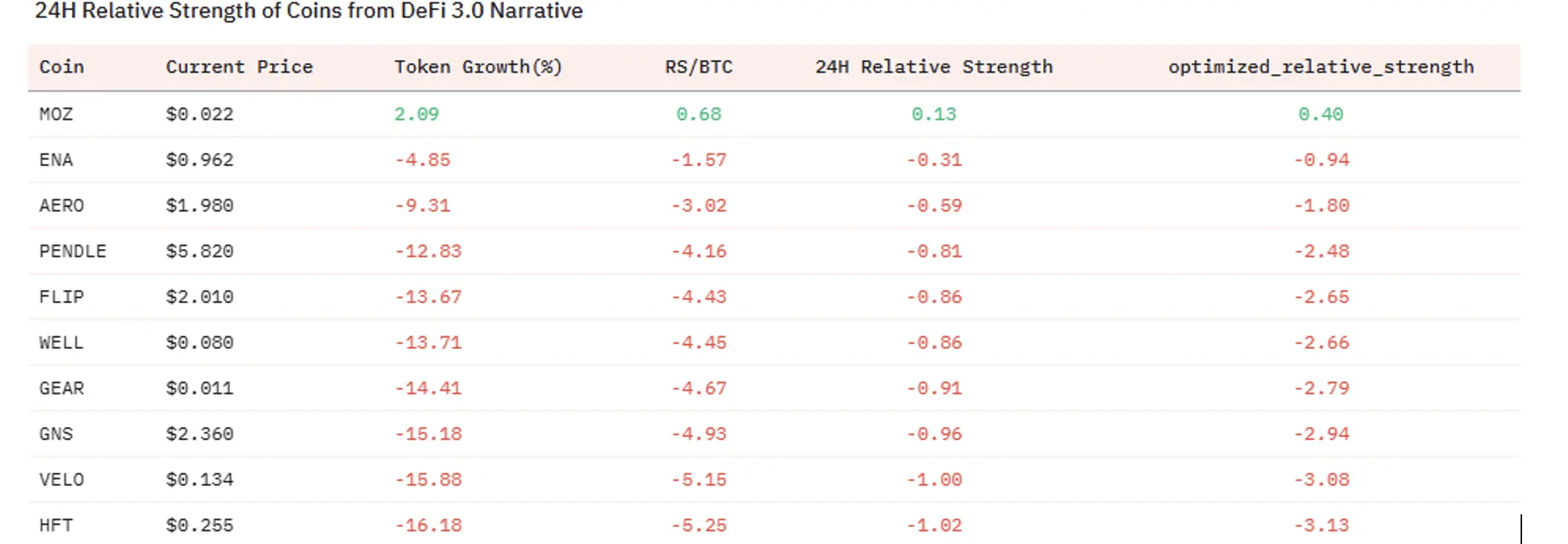Consensys Survey: What is the global awareness of Web3? Is there still confidence in the future of Crypto?
Title: 《The State of Web3 perception around the world》
Author: YouGov, Consensys
Compiled by: Huo Huo, Baihua Blockchain
Since the birth of Bitcoin in 2009, discussions around the crypto industry have been active, mainly focusing on "Money Crypto." This includes the price fluctuations of Ethereum (ETH), Litecoin (LTC), and regulatory and legal issues surrounding CEXs like FTX.
Consensys and YouGov conducted a global survey on crypto and Web3, aimed at understanding the perceptions and insights of different regions around the world regarding crypto and Web3. The survey explored typical questions about people's investment in crypto assets, as well as topics such as data privacy, digital ownership, and the recent crypto news cycle. This report interviewed 15,158 individuals aged 18 to 65 from 15 countries in North America, South America, Europe, Africa, and Asia to form the survey results.
01 Data Privacy, Value Creation, and the Current Financial System
(1) Data Privacy
Are people concerned about their data privacy? Globally, 83% of respondents believe data privacy is important. However, in countries with strong data protection laws, such as Germany (58%), the UK (57%), and France (63%), people are somewhat ambivalent about the importance of data privacy because they feel well protected.
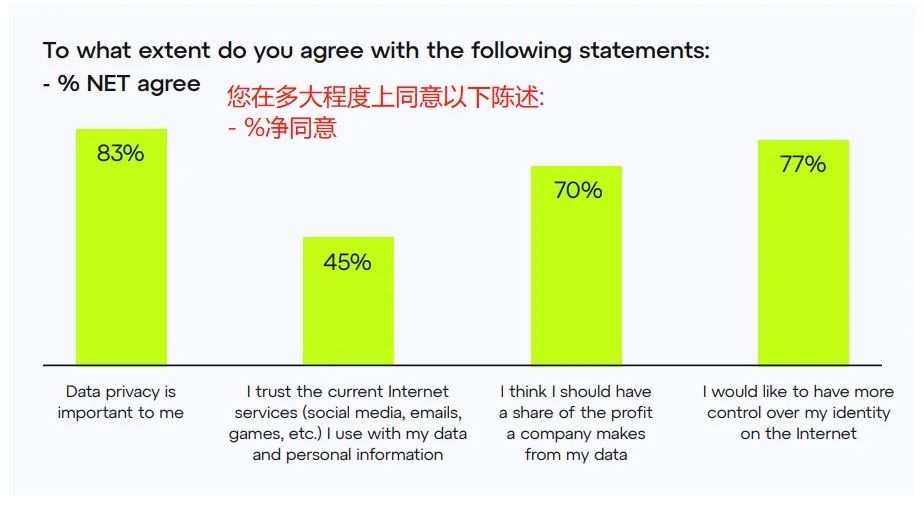
While data privacy is important to most respondents, only 45% fully trust that current internet services (social media, email, gaming, etc.) can safely use their data and personal information. Additionally, 79% of respondents wish to have more control over their online identity, and 70% believe they should share in the profits companies make from their data.
In Nigeria and Indonesia, respondents have a higher level of trust in how their data is used, but they are also more likely to want better control over their online identity and have high expectations for sharing profits generated from data.
To what extent do you agree with the following statement? Data privacy is important to me.

(2) Views on Creating Value on the Internet
There is a strong sense of value and ownership among respondents, with 50% believing they add value to the internet, and 67% claiming they have the right to own what they create online. However, only 38% feel their creative contributions are adequately compensated. Respondents from France, Germany, and Japan have a lower sense of value and ownership regarding what they create online, and they feel their contributions are less compensated.
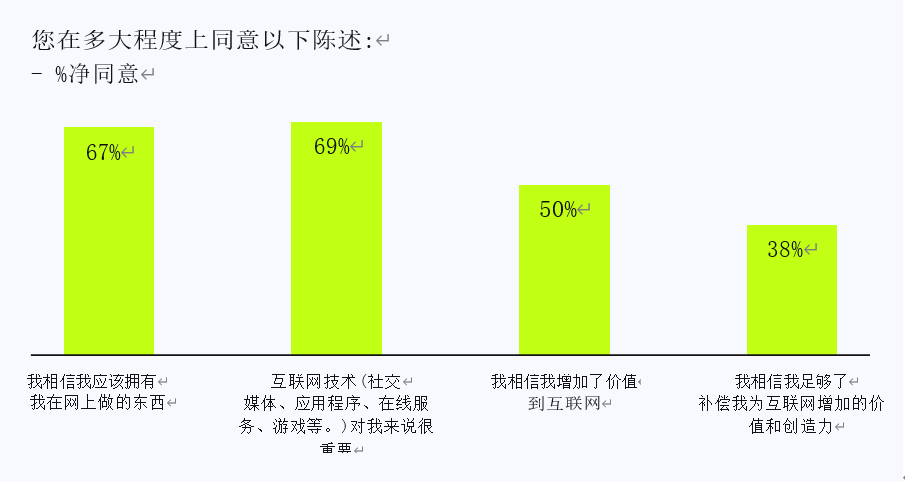
(3) Views on the Current Financial System
Most people believe the current financial system can be improved, a sentiment particularly strong in Nigeria. Furthermore, most respondents agree that Tech Crypto can help transform or rebuild the ecosystem. Countries like Nigeria, South Africa, Brazil, Vietnam, the Philippines, India, and Indonesia show higher levels of agreement in this regard.
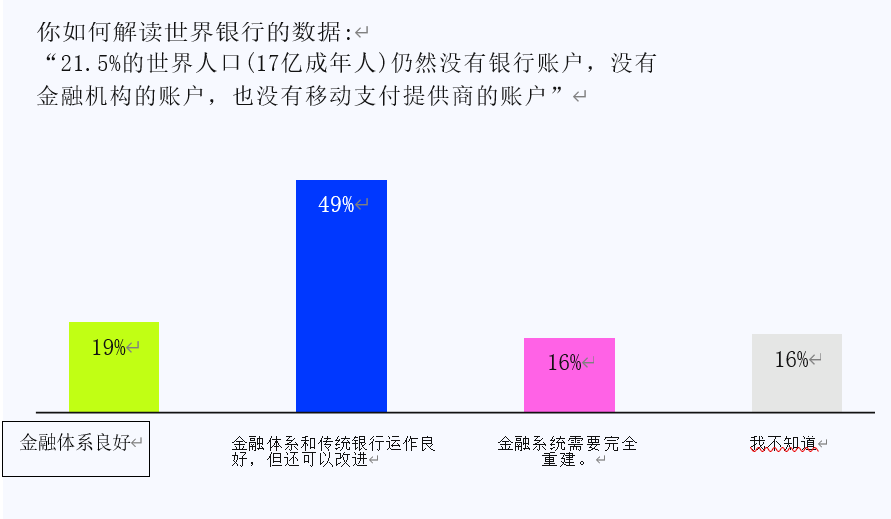
02 Adoption of Crypto Applications Worldwide:
Public Awareness, Crypto Asset Ownership, and Barriers to Entry
Despite the frequent appearance of crypto assets in media and public discussions, do people really know what crypto assets are? Do they own or plan to own some crypto assets in the near future? What are people's thoughts on the connection to crypto assets around the world?
(1) Public Awareness
Overall, most people (approximately 92% globally) are aware of crypto assets, with 50% claiming to understand what they are. The understanding of crypto assets is significantly higher in countries like Nigeria (78%), South Korea (63%), South Africa (61%), Brazil (59%), and India (56%). However, in Indonesia and Japan, the proportion of people claiming to understand crypto is lower, with only one-third saying they know what crypto is.
Have you heard of cryptocurrency? (Green knows / Blue does not know)
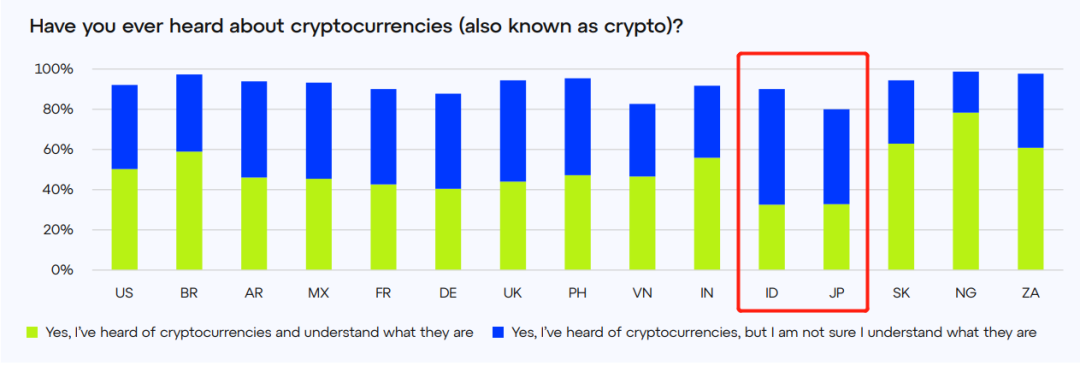
In line with the global digital divide regarding age and gender, there are significant differences in understanding crypto assets among different demographics. Males aged 25-34 are the demographic group most knowledgeable about this financial technology, while females and older respondents know less. This trend appears with varying intensity across most of the analyzed countries.
(2) Crypto Asset Ownership
Globally, 40% of respondents currently own or have purchased crypto assets. Among the surveyed countries, the highest proportions of past or current owners are in the United States, the Philippines, Vietnam, India, Nigeria, and South Africa. In contrast, Japan, Argentina, Mexico, and European countries (France, Germany, the UK) lag further behind, with a higher likelihood of never having purchased any crypto assets. Nigeria has particularly high ownership levels, with seven out of ten confirming they own or have owned crypto assets.
Have you ever bought cryptocurrency (Bitcoin, Ethereum, etc.)?
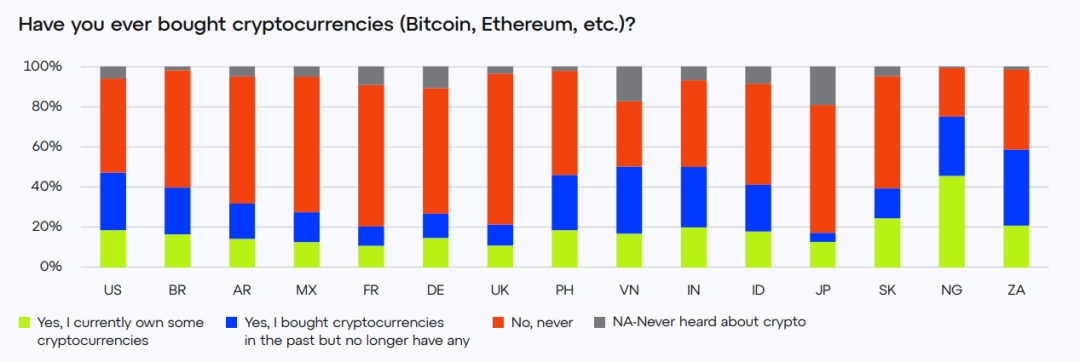
Looking ahead to the future of owning crypto assets, Asia and Africa are generally more willing to invest in crypto assets: Nigeria (90% definitely or probably will invest), South Africa (78%), the Philippines (57%), Vietnam (57%), Indonesia (56%), and India (53%). This contrasts sharply with the much lower willingness in Europe and Japan, where a high proportion of respondents confirm they definitely will not invest.
How likely are you to invest in cryptocurrency in the next 12 months?
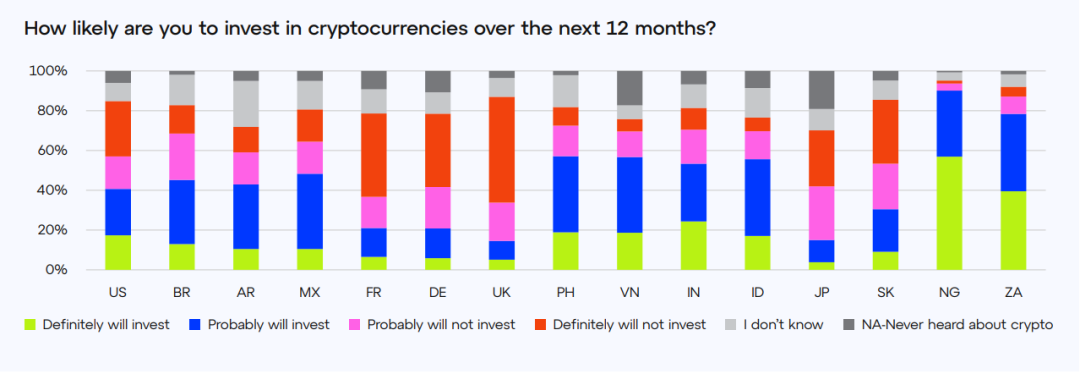
(3) Barriers to Entry
The crypto ecosystem faces challenges in increasing adoption rates, as respondents often perceive the market as too volatile, too risky, or express concerns about potential fraud. These issues are particularly pronounced in Brazil, the Philippines, and South Africa.
More education on how to safely access Web3 platforms could benefit adoption in countries like Nigeria and South Africa, where investment willingness is highest despite associated risks. This is because when respondents are willing to engage with the ecosystem, they may not necessarily know where to start or how to protect themselves, especially in South America (Brazil 18%, Argentina 19%, Mexico 20%), the Philippines 17%, and India 21%.
What do you think are the main barriers to entering the crypto ecosystem?
Please rank the following options in order of importance—top three preferred.
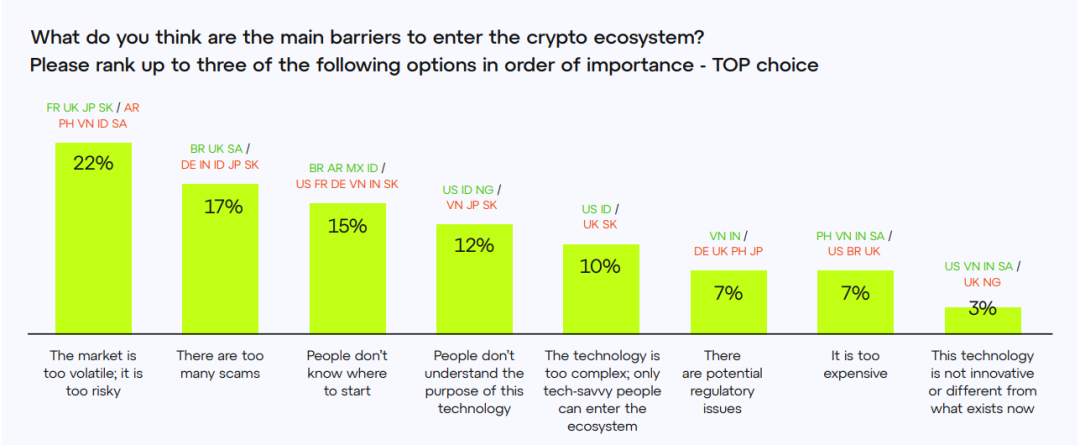
03 Recent Crypto Cycle:
The Impact of Centralized Crypto Giants' Bankruptcies
2022 was a year marked by the collapse of CEXs like FTX and Celsius, but did the public take notice?
About two-thirds of respondents globally have heard of these CEX collapses, but there are significant differences between countries. The United States, Vietnam, India, Nigeria, and South Africa have a higher awareness, with more than half of the populations in these countries being aware of it. In contrast, only 1/5 of respondents in Japan have heard of it.
Have you heard about the recent bankruptcies of financial cryptocurrency companies?
For example, Celsius, FTX, Voyager in 2022?
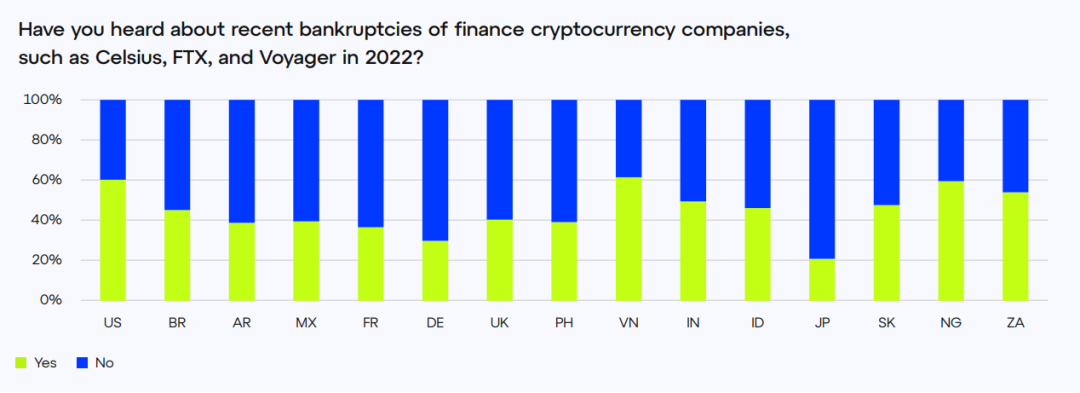
Most respondents mistakenly believe that FTX and Celsius are DEXs. This misunderstanding is particularly common in Nigeria (53%), South Africa (53%), and Vietnam (52%). Respondents from the United States and India are more likely to correctly identify that FTX and Celsius are not DEXs, but this number barely reaches 14% in both countries.
True or False: Are FTX and Celsius DEXs?
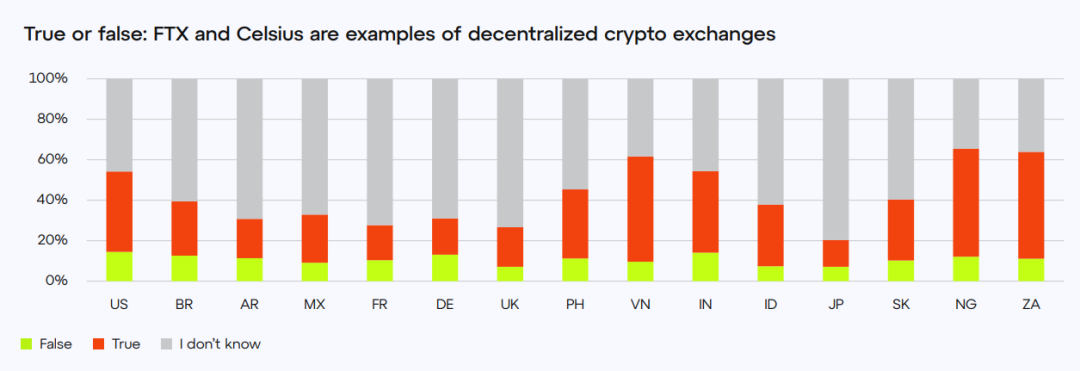
The series of CEX bankruptcies has impacted respondents' overall trust in blockchain, crypto, and Web3. However, respondents from Germany, Vietnam, India, and South Africa are more likely to claim that this has not affected their trust in the ecosystem.
Do you think the bankruptcies of several CEXs in 2022 affected people's trust in blockchain, crypto, or Web3?
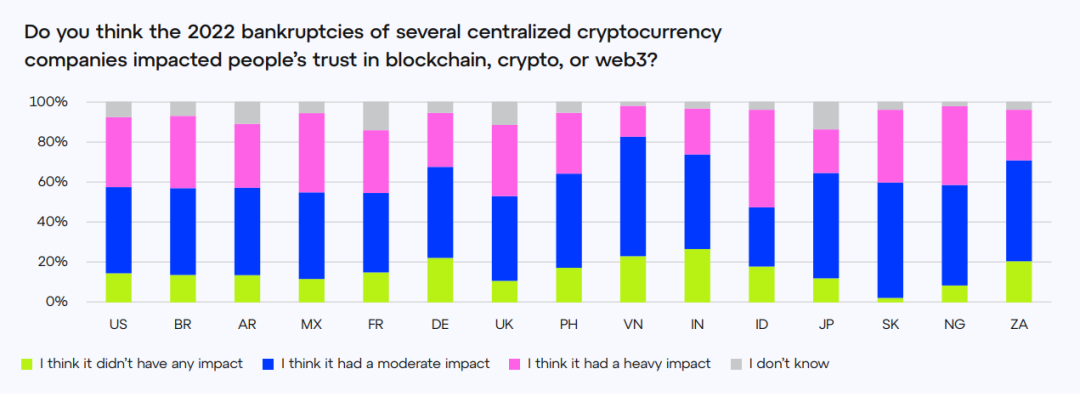
How to Rebuild Trust?
All countries agree that improving security measures and transparency is the main action to rebuild trust in the industry. South Korea and Vietnam hope for better regulatory interventions from government agencies. Accountability is also considered crucial in Asia, especially in Japan and Indonesia, while Nigeria and Argentina tend to focus on educating and communicating risks and practices to users. 04
Opportunities in Web3: On NFTs and the Metaverse
From NFTs to the underlying technology of blockchain, Web3 encompasses several different concepts. Do people know what blockchain is? Have they heard of NFTs? Do they plan to own some in the future?
Most respondents globally are not familiar with the difference between custodial and self-custody crypto wallets. This unfamiliarity is particularly pronounced in the UK (72% not very familiar or completely unfamiliar) and Mexico (70%). However, those familiar with the concept are mainly located in Nigeria (50% very familiar or somewhat familiar), South Africa (42%), Vietnam (40%), and India (39%).
How familiar are you with custodial crypto wallets and self-custody crypto wallets?
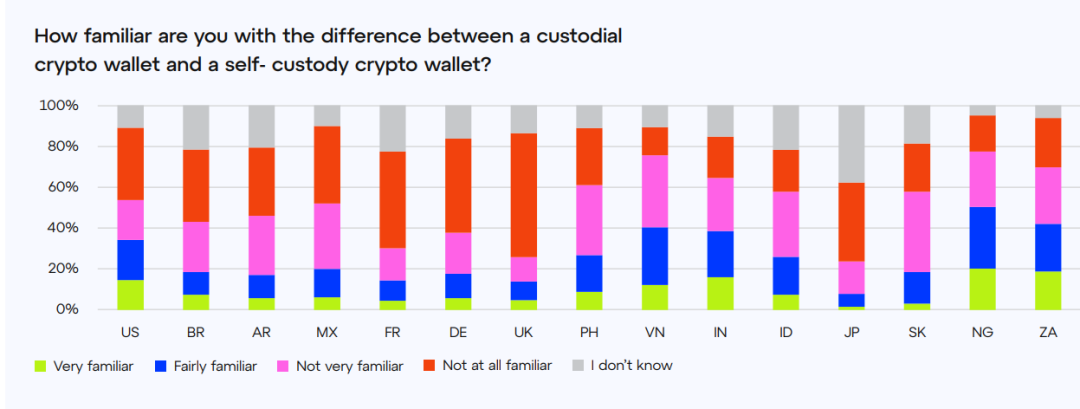
Most respondents globally are familiar with all the concepts tested in the survey. However, there are relevant differences: the most popular concepts are the Metaverse (36%) and NFTs (34%), while Web3 is the least known concept, with only 24% of respondents familiar with it.
How familiar are you with the following concepts?
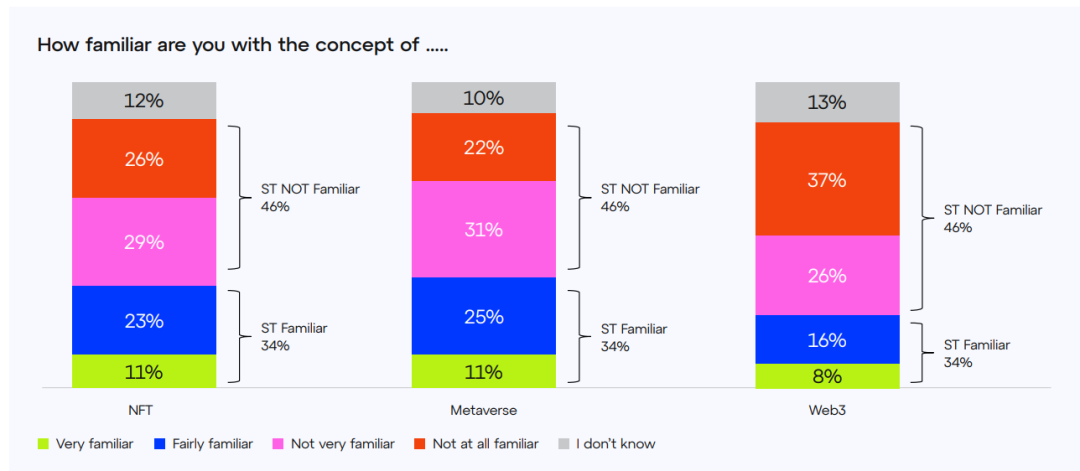 ST = net percentage (e.g., ST family = "very familiar" + "somewhat familiar")
ST = net percentage (e.g., ST family = "very familiar" + "somewhat familiar")
These trends show significant differences across countries. Respondents from the United States, India, South Korea, Nigeria, and South Africa are most familiar with the Metaverse, while respondents from Europe, Latin America, and Japan are the least familiar.
How familiar are you with the concept of the Metaverse?
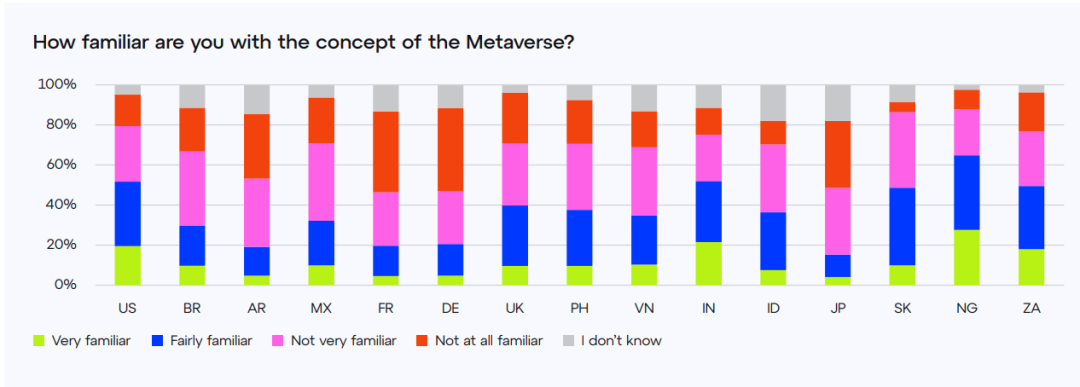
Web3 appears to be the least known concept globally. However, respondents from Nigeria and Vietnam are very familiar with this concept. Notably, one-quarter of Nigerians claim to be very familiar with it. In contrast, European countries and Japan tend to show lower familiarity, with the only exception being respondents from the UK, who tend to be more familiar, and males showing higher familiarity.
How familiar are you with the concept of Web3?
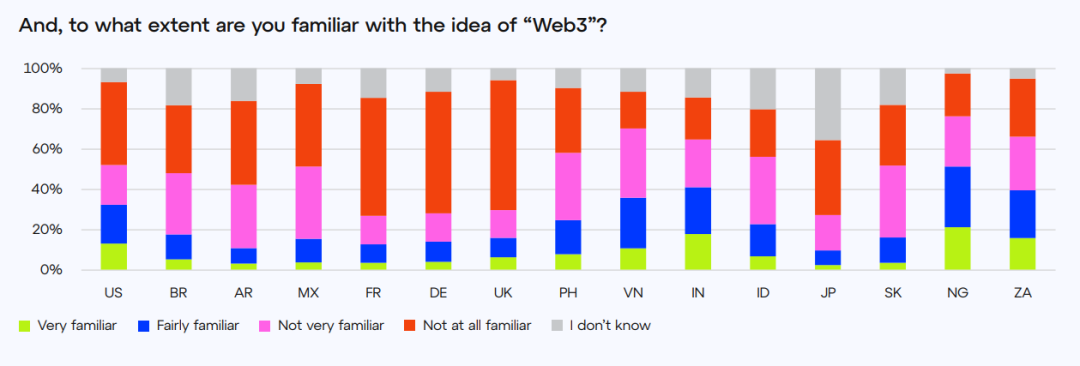
Regarding familiarity with NFTs, the United States, India, South Africa, and especially Nigeria are the most familiar countries. In contrast, the highest proportion of respondents unfamiliar with it comes from South American and European countries, as well as Japan.
How familiar are you with the concept of NFTs?
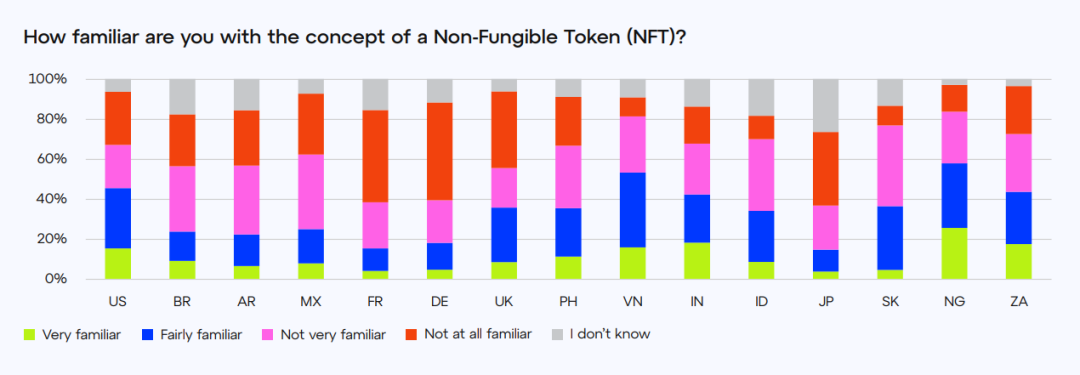
Globally, the most common Web3 activity is sending and receiving transactions, with one-third of respondents familiar with the Web3 concept participating in this task. The next most common activities include using Web3 wallets and staking crypto assets, both at 27%. Among the top five activities, the last two are using decentralized social media platforms and playing blockchain-based games.
What Web3 activities did you participate in last year?
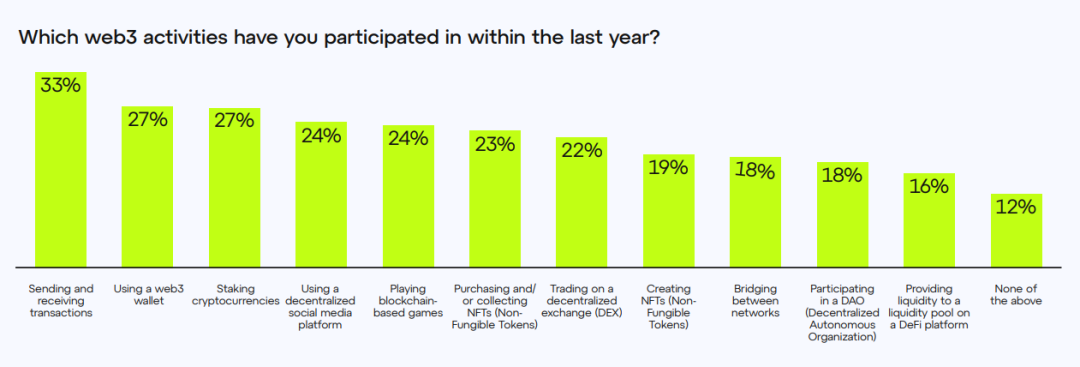
Vietnam, India, and South Africa are the countries where respondents own the most NFTs, while European countries own the least. However, these numbers are constrained by the limited awareness levels in most countries.
How many NFTs do you currently own?

Summary
- While global awareness of crypto assets is relatively strong, awareness of Web3 is low.
Overall, most people (approximately 92% globally) are aware of crypto assets. However, there are still differences between countries, with Nigeria, South Africa, and Brazil leading in this awareness. Despite the high global recognition of crypto assets, only 8% of respondents consider themselves very familiar with the concept of Web3. This highlights the disconnect between public awareness of Web3 and its potential as a solution to today's internet privacy, identity, and digital ownership issues.
- People desire more ownership and data privacy.
Although many respondents are unaware of Web3, many support the potential aspirations of Tech Crypto and the ecosystem. Fifty percent believe they add value to the internet, and 67% believe they should own what they create online. Additionally, 62% of global respondents feel their creative contributions are not adequately compensated.
Moreover, concerns about data privacy are also prominent, with 83% of respondents prioritizing data privacy, 70% believing they should share in the profits companies make from their data, and 79% wanting greater control over their online identity. These findings emphasize the importance of helping people understand how Web3 can give them more ownership over their identity and ownership online, as well as providing users with greater privacy assurances and sharing the profits companies currently gain from users' online activities.
- Regional Differences
When comparing views across countries, another clear divide emerges. European countries exhibit greater skepticism towards crypto, a behavior also reflected in countries like Japan and South Korea. In these countries, crypto is more strongly associated with negative concepts such as illicit use. In contrast, most countries in Southeast Asia, South America, and Africa generally display a more enthusiastic attitude towards crypto and Web3. Therefore, in these countries, there is a stronger association with concepts like future currency, digital ownership, or alternatives to traditional financial ecosystems.
Additionally, in countries with unstable fiat currencies like Argentina and Nigeria, crypto is seen as an important means of accessing global capital and hedging against inflation.
- From "Users" to "Builders": A Paradigm Shift
The survey results indicate an encouraging shift in mainstream attitudes, with people wanting the internet to provide more control over the data they share online and to share profits more fairly with creators. However, there is a significant gap between awareness of crypto and the actual understanding and utilization of Web3 technology. This disconnect presents a valuable opportunity for mainstream Web3 applications to address the agency gap in today's internet landscape.
We see an opportunity for internet users to begin adopting a "builder" mindset, recognizing that they can leverage Web3 products to address issues related to web ownership, identity, privacy, and creator tokenization.
Thus, this is why builders of Web3 should focus on rebuilding connections with the public around Tech Crypto, as the industry needs to establish trust and understanding of Web3's potential through a proper understanding of public perceptions and attitudes towards Tech Crypto.









